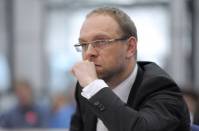Court strips Vlasenko of his mandate

Apologies for the repetition later in this report – the reasons why the court’s ruling is profoundly worrying remain the same.
In the latest blow to rule of law in Ukraine and the country’s chance of signing the EU-Ukraine Association Agreement, Serhiy Vlasenko, Batkivshchyna MP and defender of imprisoned former Prime Minister Yulia Tymoshenko has been stripped of his mandate.
The High Administrative Court in Kyiv, under Presiding Judge Mykhailo Zaitsev, took a long time in chamber on Wednesday before announcing their decision.
Zaitsev stated that they had decided that Speaker Rybak’s administrative application to have Vlasenko’s mandate revoked as well-founded. He stressed that their ruling was final and not subject to appeal.
The court has thus found that Vlasenko, while an MP, engaged in defence lawyer activities.
The court ignored objections that Rybak’s application was based on an alleged meeting of the Regulations Committee on 27 February which the opposition say did not take place.
It also ignored the confirmation from the Prosecutor’s Office that Serhiy Vlasenko had appeared in the trial of Yulia Tymoshenko as her defender, not her defence lawyer. Under the old Criminal Procedure Code the role of defender could be taken by any adult, including relatives. It does not entail remuneration.
The ruling to strip Vlasenko of his mandate was unfortunately expected.
In January Vlasenko informed that criminal cases had been lodged against him and that he expected attempts to strip him of his mandate and arrest him. He was not permitted to leave Ukraine in order to attend the Parliamentary Assembly of the Council of Europe session. He cancelled his defence lawyer certification on 22 February, though formally should have done so upon first becoming an MP. There are a very large number of MPs who are actively engaged in other professional activities.
As reported, certain developments on Tuesday had made it seriously difficult to believe the standard assurances from Ukraine’s leaders that no political motives are involved. Or would have strained credulity had any still been possible. This is scarcely the case.
All of this is so manifestly disturbing that Germany’s Foreign Ministry on Monday summoned Ukraine’s Ambassador to express Germany’s concern. .
This concern was reiterated in a statement issued on 5 March for Catherine Ashton, High Representative of the Union for Foreign Affairs and Security Policy and Vice President of the Commission, and Štefan Füle, EU Commissioner for Enlargement and European Neighbourhood Policy.
“They call on the Ukrainian authorities to address this situation so as to avoid creating any perception of misuse of the judiciary for political purposes. They recall their strong view that the final composition of the Ukrainian Parliament must reflect the genuine will of the Ukrainian voters. The Law on the Election of People’s Deputies establishes a clear, five-day time framework for the results of the elections to be challenged before the Courts. Legal proceedings which come months after the confirmation of the final election results raise political and legal concerns”.
The US Embassy also issued a statement of concern.
And just by coincidence …
On Tuesday morning, the Prosecutor General’s Office informed that the criminal proceedings brought in connection with N Okunska’s complaint that Vlasenko (her ex-husband had failed to comply with a court ruling had been terminated for want of elements of a crime. It is not clear whether this means that proceedings over charges of having wiped a video from his ex-wife’s mobile phone, and of having stolen a car which he asserts is his have also been revoked.
And what is not truly mind-boggling is why Vlasenko had, according to the report, been repeatedly summoned for questioning to the Prosecutor General’s Office’s Central Department of Investigation into Particularly Important Cases
Before tackling the issue of Vlasenko’s mandate, the High Administrative Court found no difficulty in swiftly revoking the mandate of a Party of the Regions MP, Andriy Vereyevsky. This was again on Rybak’s application, and supposedly because the MP was combining his work in the profile committee on land issues with heading an agricultural holding. The court refused to consider the question, raised by an opposition MP, of whether the alleged parliamentary committee document was real.
All quick and easy, with distressingly primitive arithmetic: one Party of the Regions MP for one opposition MP. Primitive and exceedingly unconvincing that only one Party of the Regions MP was singled out when there were many to choose from. On Tuesday opposition MP Mykola Knyazhytsky posted his “Knyazhytsky List” of 11 Party of the Regions MPs who, he asserts, “are officially continuing to engage in business activities. There are also six who engaged in them at the time they took their oath.”
The High Administrative Court had already issued one court ruling of questionable constitutionality which stripped two MPs accepted as elected by the Central Election Commission of their mandate.
Their guillotine swiftness on Tuesday and ruling on Wednesday against the real target of the exercise has already elicited unequivocal statements from EU and US spokespeople. The whole squalid affair has only enforced well-justified concerns about how the courts are being used and abused in Ukraine. It has also left little, if any, grounds for optimism about chances that the EU-Ukraine Association Agreement will be signed under the present regime.





